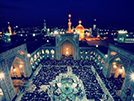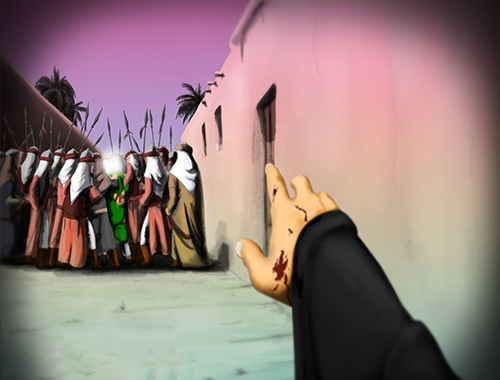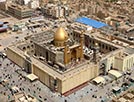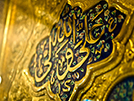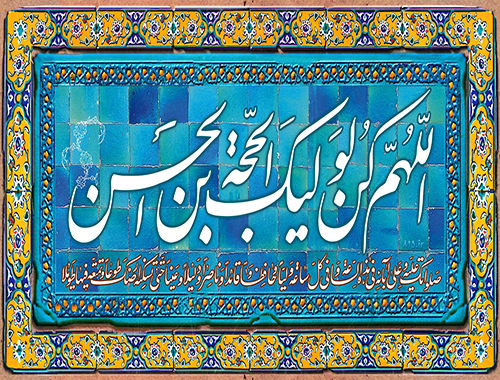Verses 1-10
- Details
- Hits: 2672
Sura Shams
(The Sun)
No.91 (Verses 1-10)
بسم الله الرحمن الرحيم
(1)وَالشَّمْسِ وَضُحَاهَا
(2)وَالْقَمَرِ إِذَا تَلَاهَا
(3)وَالنَّهَارِ إِذَا جَلَّاهَا
(4)وَاللَّيْلِ إِذَا يَغْشَاهَا
(5)وَالسَّمَاءِ وَمَا بَنَاهَا
(6)وَالْأَرْضِ وَمَا طَحَاهَا
(7)وَنَفْسٍ وَمَا سَوَّاهَا
(8)فَأَلْهَمَهَا فُجُورَهَا وَتَقْوَاهَا
(9)قَدْ أَفْلَحَ مَن زَكَّاهَا
(10)وَقَدْ خَابَ مَن دَسَّاهَا
In The Name of Allah, The Beneficent, The merciful
1. "By the Sun and its Brightness,"
2. "By the Moon when it follows it (reflects the Sun's light),"
3. "By the day when it unfolds its glory,"
4. "By the night when it enshrouds it,"
5. "By the heaven and He who made it"
6. "By the Earth and He who spread it,"
7. "And by the soul and He who peifected it,"
8. "Then inspired it to understand what is wrong and (what is) right for it,"
9. "Indeed he succeeds who purifiest it,"
10. "And indeed he fails who corrupts it."
Commentary:
Salvation Is Due To 'The Purification of the Carnal Soul'.
There are some considerable oaths pointed out at the beginning of this Sura. By one consideration, they are eleven oaths, and by another one, they are seven. In any case, in this position the number of oaths is the largest throughout the Qur'an and this shows that in these verses the solemn appeal is made to something very splendid. The matter is as important as the solemnity of the heavens, Earth, sun, and moon; that which is effective in the fate of Man.
First, the oaths will be described and commented on and, then, attention will be paid to the great subject that these oaths are made to.
"By the Sun and its brightness",
As it was mentioned earlier, Qur'anic oaths are generally for two purposes. First, the oaths pertain to the importance of the subject which the oath is made to. Second, they pertain to the importance of the affairs, themselves, since oaths are always made to great matters. In this way, the oaths make Man contemplate and evoke his thoughts to work on the great objects of Allah sublime creation through which he may find a path to Him.
The sun plays a most important role in Man's life and in the life of all living creatures on the earth, because it is not only a source of heat and energy; the essential factors necessary for life, but also it is the origin of some other life giving factors such as; winds, rains, plants, running rivers and waterfalls, and even the energy mineral sources; oil, coal, and the like, all depend on the sunlight so that if this world- illuminating-lamp ceased one day, darkness, silence and death would dominate everywhere.
The term /duha/ originally means 'those hours of the morning which follow shortly after sunrise', and, here, it means `the full brightness of the sun'.
The particular emphasis put on the term /duha/ is for its importance, when the glory of sunlight dominates the land.
* * * *
"By the Moon when it follows it (reflects the sun's light);
This sense, as some commentators have said, refers to the full moon, i.e. on the fourteenth night of the lunar month; since on this night the moon appears on the eastern horizon nearly at the time of sunset and, with its silver light, introduces itself in the sky and to the world when the world is in its most beautiful state to which swearing is done.
It is also probable that the above mentioned meaning refers to the constant dependence of the moon on the sun and getting light from it, but in this case the sentence: "...when it follows it" will be an adverbial time clause.
There are also other commentaries cited about this verse, however, this discussion will conclude here.
* * * *
"By the day when it unfolds its glory",
The term /jalla ha/ is based on /tajliyah/ which means 'revealment'.
The commentators are divided on the meaning of the pronoun /ha/ in the term /jalla ha/. Many of them believe it refers to the earth (as was mentioned earlier).
Some also believe that the pronoun refers to the sun, that is; 'by the day when it makes the sun manifest'. It is true that the sun makes the day appear, but, figuratively speaking, it can be said that the day makes the sun apparent. However, the first commentary seems more appropriate.
At any rate, the swearing is done in the names of these great celestial phenomena, because they are extremely effective both in the life of Man and of all living creatures, and day, itself, is the sign of movement and struggle; a mystery to any intelligent, active mind.
* * * *
"By the night when it enshrouds it,"
Night, with all its blessings and effects, which, on the one hand, moderates the heat of the sun and, on the other, brings quietude to living things, is completely necessary for life. It provides Man, and the majority of living creatures, with rest. If the darkness of night did not exist and the sun were to shine, continuously, there would be no tranquility, because the piercing heat of the sun would destroy everything.
Even if the regularity of day and night were not as it is, now, the same situation would exist. For instance, like the moon whose one night is equal to two weeks time on our globe, as well as in the middle of one of its days, the heat of its atmosphere; almost three hundred degrees centigrade, or at midnight when the weather is so cold no living creature, that we know of, could live there.
It is noteworthy that the verbs, in the former verses, were in the past tense while, in this verse, the verb is in the present tense. This variety of tenses may be for the fact that some phenomena, such as day and night, are not peculiar to a definite time; they belong to both the past and the future to show the generality of these incidents over a length of time.
In the sixth and seventh oaths heaven and its Creator is referred to. It says:
"By the heaven and He who made it,"
The creation of the glorious heaven with its beautiful heavenly bodies and their wonderful regularities, is one of the manifestations of Allah might and wisdom which none else, besides Him, could ever produce.
It is worthy to note that /ma/, in Arabic, usually refers to nonintellectual beings and using it for Allah, All-knowing, is unappropriate. Then, some had to consider it `ma masdariyah' (the word after `ma' is infinitive), and construed the verse' as: 'by the heaven and its structure'. But, regarding verses 7 and 8, whose commentaries will be dealt with later, we have to considcr /ma/ as a relative pronoun that refers to Allah, the Creator of all heavens. Using /ma/, for intelligent persons, referring to the word 'women' in the following verse, is not uncommon in the Arabic language, either, as in Sura Nisa, No.4, verse 3: "...Marry women of your choice...".
A group of commentators believe that the term /ma/ with the meaning of 'something', here, is for mentioning the origin of the world in an ambiguous form and, consequently, later, after careful study, some become familiar with His Knowledge and Wisdom and can change the concept of 'something' to 'someone'. But, the commentary on 'He' is more fitting.
Continuing with the eighth and ninth oaths the reference is to the Earth and the Producer of the Earth. It says:
"By the Earth and He Who spread it,"
The Earth, which is a cradle of life for Man and all living creatures, with all its wonders; mountains, seas, valleys, forests, springs, rivers, mines, and other precious sources, is a collection of the Divine Signs, each of which, if studied intelligently, is an evidence of His might and wisdom, and more important than the Earth is the Creator of the Earth Who spreads it out.
The term /taha ha/ is derived from /tahw/ used with the sense of 'to spread, spread out' and also with the meaning of 'to repel or to destroy' and, here, it means 'spread or expand', because: 1) the earth was totally submerged under water at the beginning and, then, gradually the water subsided into the low lands causing high points of land to appear and spread which is called /dahw-ul-ard/, 2) at first the earth was totally in the form of high and low lands with steep slopes that were uninhabitable.
Continuous heavy rains washed the high lands and, thereby, filled the valleys, so, little by little, dry level lands appeared, becoming suitable for Man to live and farm on.
Some commentators believe that there is also a slight hint, in this sense, to the movement of the Earth, because one of the meanings of /tahw/ is 'repel' and it may point to the 'driving' of the Earth around the sun or around itself or both of them.
* * * *
Finally, attention is paid to the tenth and eleventh oaths, the last oaths of this portion, saying:
"And by the soul and He who perfected it,"
Man is an essence of the world of creation; the best on the earth and in the heavens. The human soul is one of the greatest mysteries of the universe. Its importance is so much so that Allah swears by it and by its Producer, both.
Commentators have delivered some different probabilities as to whether the term /nafs/, here, means Man's 'soul' or his 'body and soul'. If it means 'soul' the term /sawwa ha/ (based on /taswiyah/) refers to the proportion and order of Man's soul and his spiritual faculties including his external and internal senses such as comprehension, memory, apprehension, imagination, faculty of origination, love, will, and the like, all of which can be studied in psychology.
If it means 'soul and body', both, it covers all the wonders and regularities found in the body and its different systems and these can be studied in anatomy and physiology.
However, the term /nafs/, in the Qur'an, refers to both of them.
Regarding the use of /nafs/ for both the soul and the body the Qur'an says about the 'soul': "It is Allah that takes the souls (of man) at death...", (Sura Zumar, No. 39, verse 42).
* * * *
In the next verse, concerning the creation of Man, one of the most important things is referred to. It says:
"Then inspired it to understand what is wrong and (what is) right for it,"
Yes, when the creation of Man was completed and he came into being,Allah taught him how to discriminate between right and wrong. This is the most precious gift of all granted exclusively to Man. Thus, an entity out of clay and Allah's spirit, into which He breathes an understanding of what is sin, impiety, and wrong doing and what is piety and right conduct, in the special circumstances in which it may be placed, was formed as Man.
By those faculties and talents, and these various tokens, Man should learn that his success, prosperity, salvation, and position, where he can be in a rank higher than the angels, depends on himself, on his keeping his soul pure as Allah has made it, and his failure, his decline; to the lowest degree even lower than the beast, and his perdition depends on himself soiling his soul by choosing evil.
The term /alhama ha/ derived from /il ham/ originally means 'to ingurgitate, swallow up something greedily', then, it has been used with the sense of 'to inspire a matter from Allah to the soul of Man', as if Man's soul ingurgitates the matter with all its entity. Sometimes, it has also been used in the sense of 'revelation' while some of the commentators believe that the difference between 'inspiration' and 'revelation' is that in the former, the one to whom something is inspired does not understand where he has gotten it from, but in the latter, he knows well where he has received the revelation from and how.
The term /fujur/ is based on /fajr/ and, as it was said before, it means 'break open', and since the light of dawn breaks the gloom of night it is called /fajr/, and, also, since committing sin breaks the curtain of piety and religion, it is called /fujur/.
Of course, the purpose of using the term /fujur/, in the verse under discussion, is to denote the means of this breaking and also the means and ways of its occurence.
And the purpose of using the term /taqwa/ based on /wiqayah/ with the meaning of 'protection', is that Man protects himself from sin, crime, corruption and vice.
It is necessary to note that verse 8 does not mean, as some have considered, that Allah put the means of committing /fujur/ and /taqwa/ inside the soul of Man; the very means which cause him to do wrong actions and break the curtains of piety, or the means and ways that push him towards piety and good actions. They have thought of the verse as an evidence for the existence of some contrariety in the entity of Man.
It says that Allah inspired him and taught him these two facts. In simpler words, He showed him the difference between right and wrong, as is mentioned in Sura Balad, No. 90, verse 10: "And showed him the two ways (of good and evil),".
And expressively, the soul is inspired by Allah; its Almighty and All-wise Author, with the conciousness and the faculty of discretion to distinguish between piety and impiety, right conduct and the wrong ways in life, by the means of his 'wisdom' and 'primordial nature'.
This is why some commentators believe that this verse, in fact, refers to the proposition of the idea of 'rational goodness and rational badness' and that Allah has gifted Man with the ability to distinguish betwen them.
It is noteworthy that Allah has given Man many blessings, but, among all of them the Qur'an emphasizes, here, on the inspiration of understanding 'piety' and 'impiety' and the recognition of right and wrong, because this is the most important factor in the destiny of Man.
* * * *
Finally, after these numerous important oaths, attention is paid to the result of them and says:
"Indeed he succeeds who purifies it,"
The term /zakkaha/ is based on /tazkiyah/ which originally means 'to grow' ; and /zakat/ basically means 'growth'. This meaning is used in a narration from Hazrat Ali (p.b.u.h.), thus: "...wealth decreases if you keep spending it and knowledge increases the more you make use of it.". (1)
Later, the term was used to mean 'to purify', perhaps because the purification of wealth from putridity causes it to increase. In the current verse both meanings are suitable.
Yes, 'salvation' depends upon preserving the soul in its original purity against its getting soiled, polluted and clouded from carnal desires, by submitting it to the will and the pleasure of the Lord. This is the main, right goal in the life of every human individual, male and female, to succeed in salvation by the way of /tazkiyah/, otherwise, he or she will be in perdition.
* * * *
Then, our attention is directed to the contrary group of people and says:
"And indeed he fails who corrupts it."
The term /khaba/ is based on /khibah/ which means 'to be in a hopeless state, deprived, damaged'.
The term /dassaha/ is based on /dass/ which basically means 'to foist something unwillingly', as the Holy Qur'an says about the pagan Arabs who hatefully buried the baby girls alive: "...Or bury it (alive) in the dust...", (Sura Nahl, No.16. verse 59). And hidden, harmful actions, in Arabic, are termed /dasisah/.
It is also said that the term refers to sin and corruption, because wrongdoers and sinners hide themselves.
Further, it has been said that the objective meaning of the term is that sinners conceal themselves amongst the good-doers, or one conceals his soul in vice, or, yet still, one hides vice and corruption inside his soul. In any case, it refers to sin and evil which contrasts with piety.
It is also possible to gather all these ideas in the vast meaning of the verse.
Thus, those who are successful and those who fail in their lives, in this world, are defined here. The characteristic of these two groups is only the following: Piety and the growth in the spirit of virtue and obeying Allah. or impiety and polluting the soul with sin and corruption.
A tradition from Imam Baqir and Imam Sadiq (p.b.u.th.), commenting on this verse. says: "Indeed he succeeds who obeys, and he is deprived who disobeys" (2)
Again, commenting on these two verses, the Messenger of Allah (p.b.u.h.) is narrated to have said in a tradition: "The soul succeeds that Allah purifies, and the soul is deprived that Allah deprives of every goodness.".
* * * *
Explanation:
Discussion on the relation of the Qur'anic oaths and their solemn affirmations follows:
What relation is there between these eleven highly important oaths and the truth for which the adjurations are fulfilled?
It seems that the main purpose is that Allah wants to tell Man that everything, either material or spiritual, was made ready for him to enable him to reach his salvation. On the one hand, He made the world illuminated and fruitful with sunshine and moonlight for him to live in, and brought the regularity of day and night into existence on the Earth to make his life calm and useful.
On the other hand, He created him with a soul gifted with all applicable talents and merits necessary for this aim, such as; a wakeful conscience and a sense of understanding piety and impiety for paving the way to felicity. Yet, he does not purify his soul, but, follows the intrigues of Satan.
(1) Nahj-ul-Balaqa, Saying 147.
(2) Majma'-al-Bayan, vol. 10, p. 498.


